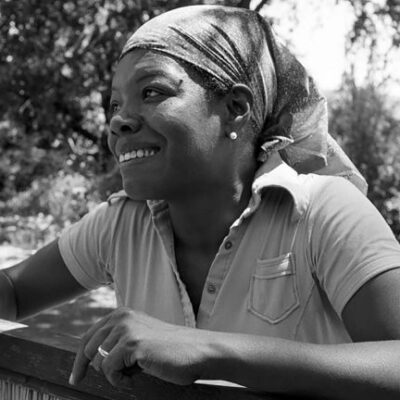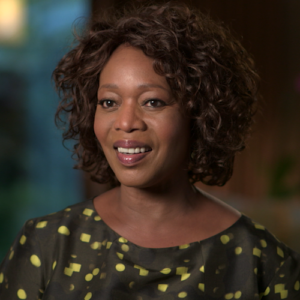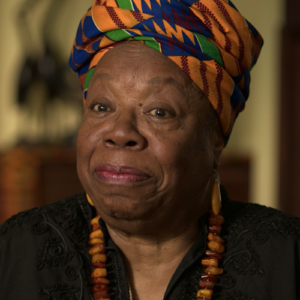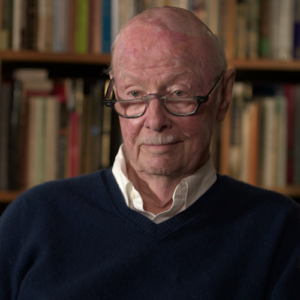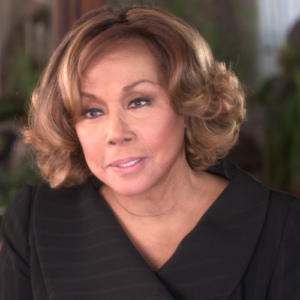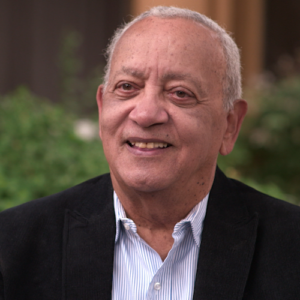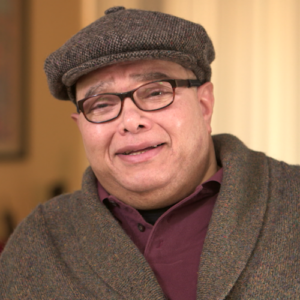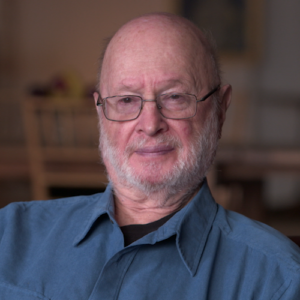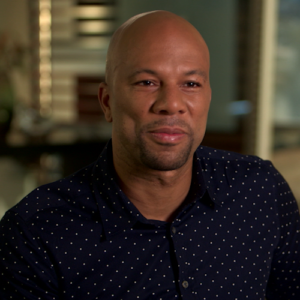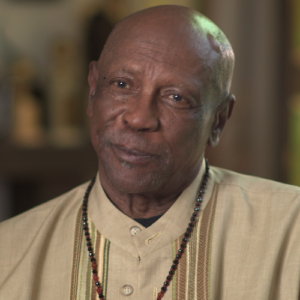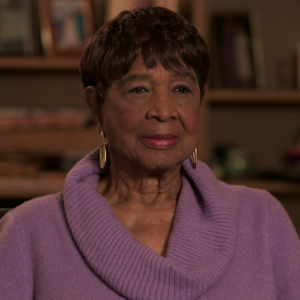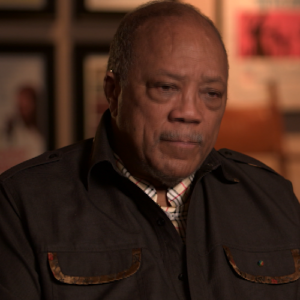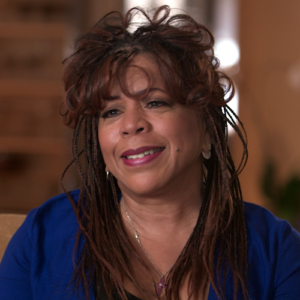Interviewer: So what was that first early experience with her work?
John Singleton: Well, my my relationship with Maya Angelou goes back to childhood. You have to understand, I’m a I’m a child of the late sixties, early seventies. And Dr. Angelou was a pivotal figure through the different times, but specifically for me in my life through the early seventies. She was a pivotal figure on various mediums on television. And, you know, she I saw her first as Kunta Kinte, his grandmother and roots. And I you know, I saw this woman, you know, talking to too good to contain LeVar Burton character and stuff. And she was so much, very much like my grandmother or or one of my aunts. And I would see her and the various mediums, you know, speaking very eloquently on television and and talking and stuff. And then I think it was around junior high school. Well, no, maybe Harlem Elementary School, you know, where we were exposed to some of her various poems. And I still rise, you know, and and collective portrait works. And then her book, her first biography, I Know Why the Caged Bird Sings. And so, you know, I think in a way in which she’s one of those people who, you know, as a young black person growing up in South Central Los Angeles and in America, if you if you’re a little bit conscious of literary figures or of artisans of note, you know who, you know, Maya Angelou is. And so that’s that was really my thing. That was really my thing. You know, she was always someone that that I looked up to just to to hear her. You know, you can be somewhere and you’d hear her voice and you’d turn and you’d be like, okay, you just want to hear everything that’s that’s going to flow from her lips. And you know that that’s what it was for me as a kid.
Interviewer: Nice. How did you eventually meet her?
John Singleton: I met her. I met her because I was in the process of developing the the Poetic Justice script. And I was having problems writing the poor poetry of the young woman I wanted and the script. And I just said, you know, I’m sitting here and I’m reading, Maya Angelou is poetry for inspiration. Why not just call her up and see if I can use her poems as this young woman’s poems? Because that will expose those those poems to the world. You know, the people that know them will be will appreciate a movie, but the people who don’t know them like, wow, this is really interesting. And so we arranged a meeting at her friend’s place in West L.A. and it was it was a very warm, cordial meeting. And, you know, and I think it started a great friendship because, you know, just a joy to to sit and talk to her about her life’s experiences and musings on on on the world, you know, either contemporary or or things that are the very famous people famous. But I’d say all the very interesting people that she she had encountered in her life, that she’s countin. I mean, she was a contemporary of Malcolm X, you know, she knew a crummy Nkrumah. She knew, you know, Ray Charles, Jimmy Baldwin, you know, so many different people that have influenced my life as an artist. Maya Angelou was friends with. And so the opportunity to have her be a part of my film and honor of her letting me use some of her poetry in the film and then making an appearance in the film was really, really was something. She was like, you know, she became somewhat like an aunt to me.
Interviewer: Nice. Nice. At that time, there weren’t very many black women taking the lead in a film. Mm hmm. So paint a picture of those times, because here it is, your use of Maya Angelou as poetry and Janet Jackson. For people today that may not know she was Madonna, Lady Gaga, whomever she was, it was a time where she and Pop were really pushing the culture. And then you do something with the black woman as the lead, and then you put Maya Angelou’s poetry in there. I don’t know if you how you work with Janet Jackson on that, but talk a little bit about that.
John Singleton: Well, I mean, it wasn’t something that was. Really over Intellectualize. I was just saying that that, you know, I have this, you know, great, beautiful, talented pop figure in her first movie and she’s supposed to be a writer. And so I had to, like, find some way to give that that some gravitas to to that character. And that’s where the portrait came in. And, you know, specifically the poetry of Maya Angelou and so on, you know, And then I just I felt that, you know, to use some of the poems, you know, you know, specifically a phenomenal woman and some of the other ones, you know, it would be something that the specifically the women watching the movie, you know, of all shades will really gravitate to or they would really appreciate them. You know what I mean? Like, you know, and it was, you know, hey, I was 23 or 24 years old and I’m just really excited to make movies and be in the business and stuff. And I come from a Afrocentric artistic background where I was always exposed to the art and from a from a black perspective. And it was something that I really wanted to to just propagate. And every and everything I did as a as a filmmaker. So, you know, and then, you know, there’s also the thing of really wanting to meet your idols and, and spending time with with Dr. Angela and, and having her be a part of my project was really, really an honor for me.
Interviewer: How was she a part of it? She did a cameo. Mm hmm.
John Singleton: Was she? She did three days. Yeah, she did three days acting in it. And, you know, it’s really funny because, you know, I had scripted lines and stuff, but, I mean, I’m like, you know, hey, I’m a kid. I’m like, you know what ad? I had Dr. Angelou here, and then I had two other women that were actresses. And I said, What are we going to do with this? We’re just going to improv this. We’re going to Ambra because your words, whatever you’re going to improv is more, much more eloquent and interesting than anything that I could possibly possibly write, you know, at that point. And I would roll the camera and I’d sit I you know, I just it was a really great scene. And the picture that I guess you can whether she’s talking about she’s making a comment about the youth of today and it’s basically just, you know, Maya, you know, flowing and flowing about her perspective of what what the youth of today, you know, and how they are about love and different things and stuff. And I use her voiceover to comment on what’s happening in the environment in which they are. And it was phenomenal. You know, and it’s funny because at a certain point she’ll tell you this I can’t push myself, you know, to for more and more improvization, you know, like, you know, going through, you know, real as a film and stuff. And then at a certain point, she just like, okay, Mr. Singleton, I have no more words to write for you. It just it’s, it’s like directing herself and like, you know, like, oh, I’m not giving, you know, more words, you know, I gave you enough for the day. You’re going to have to make do with what you have. And then I had to take it for what it was. You know, I love her. I love her.
Interviewer: It’s late in the day in the life feel of poetic justice and the fact that it was very raw and very honest and it had a grit of the street that we haven’t really seen on the screen at that time. A lot of people hadn’t seen. But Maya Angelou, whose work in Caged Bird, told some things, got banned because it was just.
John Singleton: Yeah, Yeah.
Interviewer: So do you feel like your work and her work have something in common in that?
John Singleton: Well, I wouldn’t look at it like that. Would even, you know, elevate my work to her work. And I sense that it’s just the truth, you know? I mean, you know, I think it’s all about the truth and finding the truth. She is a consummate Renaissance artisan and in so many different ways. And I think that true artists, they always have some type of measure of of honesty in whatever they’re expressing. And that’s what she’s done. She’s done it very, very well of over different periods at times. And that’s what show through. And it’s really interesting to I you know, poetic justice is one project and everything, but I did it when I was very, very young. And this movie that I did a few years later after Poor Justice because I have a dubious thing about that movie, you know, like, you know, could have made it better, what it was. And I’m this kind of rusted. Everything. You know, it does sort of have her poetry in this. But there’s another movie that I made that Dr. Angelou saw called Rosewood, and it made it a few years after Poetic Justice. And I don’t think she was really very proud of poetic justice, you know, because it was a lot of cursing. And when I showed it to or she is like so much cursing and antics, she was appalled. But the cursing but the cursing and these guys not in these characters not being able to articulate their words elevates the poetry, you know, and and what’s happening and with this with this girl, you know, and her expressive, you know, I mean, so, you know, whatever it is, a pop culture expression, whatever. But getting back to this, I saw her a few years later and she had seen the film that I had made called Rosewood, which was about an incident in the 1920s in Florida. And she says to me, she gives me this warm hug, you know, motherly hug. And she says, Baby, you’ve done it. You’ve done it, you’ve done it. I hope I did it good at present, but that made me feel so good. But that she really you know, she really, really gave me some love and respect as as an artist doing something that it was telling a story that was a very difficult story to tell, that, you know, that I actually, you know, gave up a lot of blood, sweat and tears for and the story. I feel the stories that she tells within her biography is and sometimes in her oral storytelling, it are and are poetry are visions and expressions that are in our souls. But only she can articulate. And, you know, that’s what really makes her very, very special as an artist.
Interviewer: So you you mentioned this, but I want to say it again so people know. I mean, you were in your twenties basically about 24, 25 years.
John Singleton: I was 24.
Interviewer: Okay. And you had had two Oscar nominations for Boyz n the Hood.
John Singleton: Mm hmm.
Interviewer: And you come out with poetic justice. And at that time, I think Maya Angelou was 65 years old. Mm hmm. So with this 40 year span between the two of you and her and the culture, how did you all get along? And how did you see her relevance with that younger generation?
John Singleton: I mean, I’ve kind of ACIP before as artists, as artists, you know, budding artists in our early twenties, you know, like people like myself at that time and like Pop Tupac, we had been raised on her poetry, We had been raised on on my Angelo’s personal expressions, whether or not there being her literary work or her acting or her making public appearances on whatever it was on television. So for her to to be around us, you know, in our early twenties was like an honor. It was like, you know, wow, You know, this is our this is our auntie, you know what I’m saying? You know? So, you know, we all were kind of humbled by being in our presence and and everybody tried, you know, to a certain degree, to be on their best behavior, you know, with a few incidences. But, you know, it’s like.
Interviewer: That’s exactly where I want to go to the Tupac incident. Yes. So we hear her tell the story all the time. Yes, I could summarize it, but I think you know the story. I’m talking.
John Singleton: Yes, yes, yes.
Interviewer: And so I want to hear it from your perspective, what happened that day on the set.
John Singleton: Well, what you have to understand about the incident where Tupac, you know, had a tantrum on the set of a poor address. This was this was the period in which the L.A. riots had just broken out. Okay. You know, the riots had just broken out. So there were probably maybe a few days before.
Interviewer: Just because we’re covering such an age group, the talk about the specific riot that had broken out because this was the Rodney.
John Singleton: Okay. Yeah. You have to understand that with with with the incident on the set of Poetic Justice when Tupac had a tantrum that we were a few days prior, after the 92 riots that happened in Los Angeles and around. So the whole set was really tense and there was this extra that was on the set and he was constantly goading Tupac from afar. You know, making derivations of his name, you know, just different type of things and heckling him and, you know. You know, he was a kid is 20 years old. All of the stuff that was going on swirling around him was new to him. It was all new to him, you know, being, you know, the star of the movie, you know, opposite Janet Jackson, who was already an established talent. And he’s like thrust at 20 years old to be on parody with her and hang, you know, And so when the dude, you know, kept flashing in, I’m at a certain point he just went, you know, he just went, want to do it? Just like, you know, he’s going to whip his ass, you know, and going after him, chase him all around and everything. And the crew was Chasing Nemo trying to calm them down and stuff, and nobody can. He was just up a straight tornado. And Dr. Angelou just said, Honey, come here, Tony, come here, come here, come to me, come to me. And she came in them. He came to her and she put her arms around him and she just walked him away. And they had their own private moment. You know, I don’t know everything that was said in that private moment and stuff. Right. But, you know, for someone like a young artist at 20 years old, for PA who were who considered himself a poet, himself a budding poet, and so to to have, you know, you know, a literary, you know, an artistic figurehead like Dr. Maya Angelou, hug him and talk to him, you know what I mean? And guide him. And for him, it was like it was golden, you know, it was a golden moment. He told his mother, Afeni Shakur, about it. And Afeni wrote my a letter and thank you for looking out for the park. And it was a very confusing time for him. You know, it’s it’s really interesting that two pivotal figures of the late 20th century would meet, you know, on a movie set like that. You know, it’s I think it’s very indelible.
Interviewer: Right? Prior to the release of Poetic Justice, you named your daughter just as my singleton.
John Singleton: Yes. Yes.
Interviewer: Tell us about that.
John Singleton: Well, I mean, I it’s funny you bring that. I was going to tell you that. Yeah. My my oldest daughter is named Justice Maya Singleton in honor of Maya Angelou. And, you know, it’s just because I have such a reference and respect and love for her as a person. And, you know, she’s ah, she’s been a guiding force to me. I’ve spent time at her home in Winston-Salem. She makes a mean apple cider. She makes a mean apple cider. And she cooked, you know, several times and stuff. And, you know, it’s almost like being with your grandmother, you know what I mean? Who was like, you know, who wants and accepts your love? But then, you know, you’re like a pesky fly, you know? And I would sit there with her and her friends and they’re like, you know, this is old bitty women, you know, sit and bickering and talking and and about the past and different things that, you know, that concern them, contemporary about the past and stuff. And she would go and I you know, I learned to be very quiet because I turn into like a ten year old boy at this point and she’s talking about different things and different, you know, different figures. And then, you know, I would interject and say, you know, well, can you tell me a little bit about, you know, you know, how was how you know, how was Jimmy Baldwin, How was Jimmy Baldwin as a person? And she goes, oh, oh, it’s the silences. You know, It’s like, oh, I’m like, like, you know, I’m like, well, what can I ask about? Because I have a dozen other things I would love to ask, you know, you know, about her, her time in Africa, you know, and her times as a dancer and and you know, her the period, you know, in which, you know, she spent time with Malcolm X and, you know, and Alex Haley and Ray Charles and all the different stories that she has and stuff. But it’s like, you know, pulling it out, you know, she says she says she says, she says it. And one point in passing and a discussion and stuff, we’re just hanging out there at the table. She says, Well, at one period I thought myself and Ray Charles could really have something, but it was a passing thing. She has all these different liaisons, she has all these different designs with these men. And you want to ask her about this one? Ah, this one and this one. But, you know, I was like, okay, what the hell is appropriate to talk about? You know what I mean? Like, you know, but, you know, pull it and out of her and everything, you know. But I love her because you have a woman that is like. Who is like a who’s off like a tree trunk. You know, I mean, she’s like a redwood, you know? And she you know, she has deep, deep roots within American culture. You know, I mean, you know, American culture, first and foremost, you know, and the tradition of storytellers like Mark Twain, you know, And she just really, really, you know, is is one of those people that whatever period in which she was flowing, she was doing something for the betterment of of creativity. You know, she just, you know, and she explored all of those various things. And I just I love it.
Interviewer: During in 2004, when the Dga’s African-American Steering Committee gave her as a dual member, a Guild member, a tribute to her, a master storyteller. You were a part of that event. I don’t know if you were part of the idea to do it or whatever. Can you tell us something about that event?
John Singleton: I don’t remember too much about. I remember because she had directed a movie that was a movie that she directed with Don in the Delta and with Alfred. What were and and Wesley Snipes, which is really a great, great way to film, you know. And then she you know, she had directed stuff previous to that and and everything. And I mean I mean, I think I sort of set it on in the sense that she she was an inspiration to to everyone who wants to tell stories because there are so many different ways in which to tell stories. But at the heart and soul of her is is in this tradition of the the the tradition of African oral storytelling. And that’s where it all begins. If you can express yourself and tell a story orally and capture an audience or a group of people, you know, orally, that it takes us all the way back to the tribal days where people gathered around the fire, you know, and someone would go and express and tell out the the the stories of the tribe. And that’s what she is. You know, she is the she is the the tribal queen of storytelling.
Interviewer: Wonderful. I just have one more thing. Maybe you can pick up anything on this. But you may have this. You may not. But many people have a quote or a saying of my know that comes to mind and a meaning for it or something. Is there a, you know, a wide range of her body of work? But is there anything that is that you remember that inspires you? Any particular quote?
John Singleton: Just the title of my favorite poem of hers. I Still Rise. That’s I mean, I use that all the time. I use that all the time. I just I you know, it’s my favorite poem and, you know, just the title. I still rise whenever I feel bad. You know, I, I refer back to that poem you mentioned.
Speaker 3 Down there would be interesting to get your just give us a quick your thoughts about that film down in the Delta because we don’t have too many people talking out of the interesting is your film director your perspective.
John Singleton: With the the what’s special about down down on the delta is what she brought to the material in terms of the the the gravity of of. A family going back to their roots and then finding strength and and, you know, and discovering those roots, you know, a family that is kind of become scattered to the winds, coming back to become a cohesive unit. And that’s what I really got out of that picture. And I think that she the movie is basically pervades with with with with what Dr. Angelou is about in terms of culture and soul and heart, you know, and that’s what was expressed in that picture.

